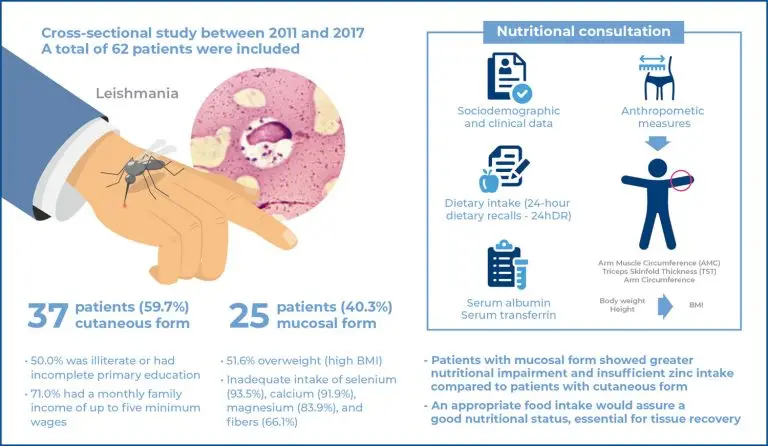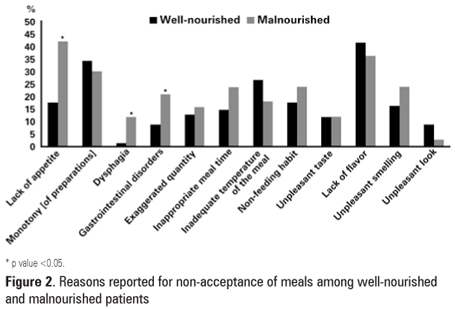17/Feb/2025
Adequacy of nutritional status and dietary intake of adult and elderly patients with American Tegumentary Leishmaniasis
einstein (São Paulo). 17/Feb/2025;23:eAO0992.
View Article17/Feb/2025
Adequacy of nutritional status and dietary intake of adult and elderly patients with American Tegumentary Leishmaniasis
DOI: 10.31744/einstein_journal/2025AO0992
Highlights ■ Most patients had an inadequate intake of selenium, calcium, magnesium, and fiber. ■ Patients with mucosal had lower body weight, arm muscle circumference, and serum albumin and zinc intake. ■ Mucosal is associated with insufficient zinc intake, low body weight, and the depletion of serum albumin and transferrin. ■ Oropharyngeal lesions are associated with calorie malnutrition and serum protein depletion. ABSTRACT Objective: Patients with American Tegumentary Leishmaniasis often experience malnutrition, weight loss, and dehydration; however, their eating profile […]
Keywords: Communicable diseases; Eating; Leishmaniasis, cutaneous; Malnutrition; Nutritional assessment; Wound healing
22/Mar/2022
Brazilian Guidelines for Nutrition in Cystic Fibrosis
DOI: 10.31744/einstein_journal/2022RW5686
ABSTRACT Objective To develop a scientific consensus on nutrition in cystic fibrosis. Methods Sixteen coordinators elaborated relevant questions on nutritional therapy in cystic fibrosis, which were divided into six sections: nutritional assessment, nutritional recommendations, nutritional intervention, dietary counseling, special situations and enzyme replacement, and gastrointestinal manifestations. Two to three specialists in the field were responsible for each section and obtaining answers formulated based on standardized bibliographic searches. The available literature was searched in the PubMed®/MEDLINE database, after training and standardization […]
Keywords: Cystic fibrosis; Nutrition therapy; Nutritional assessment; Recommended dietary allowances
21/Oct/2020
Discriminative power of an adapted version of Nutritional Risk Screening 2002 applied to Brazilian older adults
einstein (São Paulo). 21/Oct/2020;18:eAO5309.
View Article21/Oct/2020
Discriminative power of an adapted version of Nutritional Risk Screening 2002 applied to Brazilian older adults
DOI: 10.31744/einstein_journal/2020AO5309
ABSTRACT Objective: To investigate the discriminative power of Nutritional Risk Screening 2002. Methods: A cross sectional study involving one hundred participants aged ≥60 years. The original and adapted versions of Nutritional Risk Screening 2002 and the Mini Nutritional Assessment were used. Nutritional Risk Screening 2002 adaptation consisted of a lower age cutoff (60 years or older) for addition of one extra point to the final score. Results: Screening using Nutritional Risk Screening 2002 revealed higher nutritional risk among patients aged […]
Keywords: Aged; Malnutrition; Nutrition therapy; Nutritional assessment; Nutritional status
09/Apr/2013
Acceptance of hospital diets and nutritional status among inpatients with cancer
einstein (São Paulo). 09/Apr/2013;11(1):41-6.
View Article09/Apr/2013
Acceptance of hospital diets and nutritional status among inpatients with cancer
DOI: 10.1590/S1679-45082013000100008
OBJECTIVE: To verify acceptance of hospital diets as to the nutritional status among patients admitted to the Oncology/Hematology Unit of a tertiary care hospital. METHODS: A cross-sectional study conducted among 100 patients, aged >18 years, of both genders. Body mass index and subjective global nutritional evaluation by patients were used to detect the nutritional status. The rest-ingestion index was used to evaluate diet acceptance, and the reasons for non-acceptance were identified by means of a questionnaire. Data were expressed in […]
Keywords: Diet; Eating; Neoplasms; Nutritional assessment; Nutritional status
01/Oct/2011
Malnutrition in school children in an urban-rural region of the extreme South of São Paulo city
DOI: 10.1590/S1679-45082011AO2045
ABSTRACT Objective: To evaluate the persistence of nutritional deficit in a sample of schoolchildren. Methods: A cross-sectional study of 1,761 schoolchildren between 6 and 10 years from 3 schools. They were assessed by Z scores of weight for height and height for age, according to the World Health Organization. The variables studied were gender, age, grade and school year. The χ² test was used to relate the nutritional deficit with the variables. Results: Of all children 8.5% were malnourished according […]
Keywords: Child nutrition; Nutritional assessment; Nutritional status; Protein-energy malnutrition



